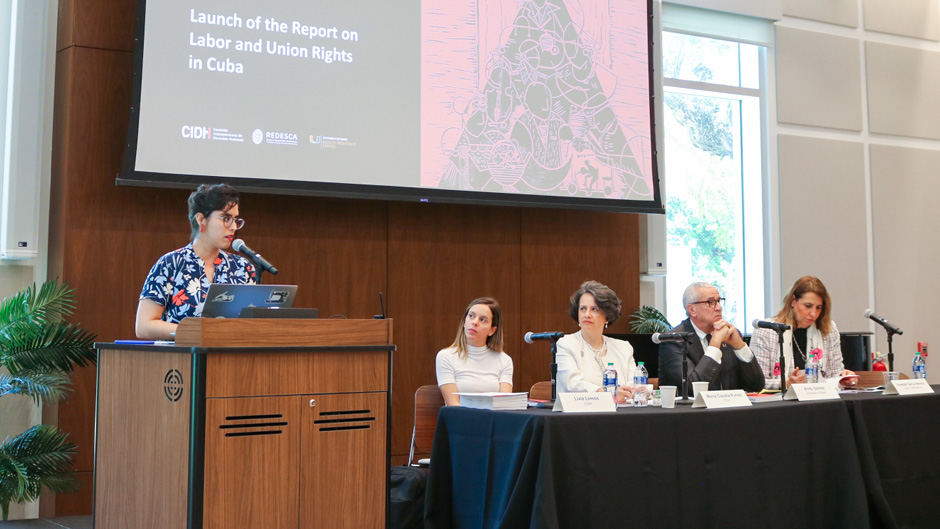One worker said her monthly salary only covered the needs of her family for seven days.
One student about to graduate was forced to pick between two jobs—not in her field—or forfeit her entire five years of university studies.
Another said that since he did not participate in government political demonstrations, he was forced to leave his job because of mental and psychological stress.
These were some of the testimonies from Cuban nationals included in a study put together by the Inter-American Commission on Human Rights (IACHR) of the Organization of American States (OAS).
The study was unveiled last week at the event “Human Rights in Cuba: a Report on Labor Conditions from the Inter-American Commission on Human Rights” held at the University of Miami Libraries Kislak Center. It was co-sponsored by The George P. Hanley Democracy Center.
“This report could be called a pioneer report,” said Maria Claudia Pulido, executive secretary of monitoring and technical cooperation of IACHR. “One of the biggest challenges was that we did not have much official government information.”
Since they did not receive answers to their letters from the Cuban authoritarian government, the commission relied on its own research. It held 80 interviews on Zoom with Cuban workers, as well as with members of civic organizations, to monitor and analyze the state of the Cuban labor and syndicates.
IACHR also held a meeting on the island with former members of the judicial system, including lawyers and judges.
One of the report’s missions is to highlight the abuses against human rights being carried out in Cuba against its workers and promote an “Inter-American conversation about these issues,” said Pulido.
The investigation revealed that Cubans faced several grave challenges in the labor force.
Soledad Garcia Muñoz, special rapporteur on Economic, Social, Culture and Environmental Rights of the Commission (REDESCA), said that among the most egregious findings were: “gender discrimination, racial discrimination, discrimination for sexual orientation as well as for physical condition.”
She noted that “the IACHR and REDESCA believe that the right to work is a fundamental right and inherent to human dignity.”
The report also indicated a lack of liberty to join unions or syndicates and arbitrary restrictions for faculty members in academic institutions.
Testimonies given by Cuban workers showed that jobs and promotions were most often tied to the worker’s allegiance to the politics of the ruling Communist party.
Similarly, those wishing to join syndicates to defend their rights were often intimidated and ostracized by government officials. Even “cuentapropistas,” or independent workers, who tried to organize themselves in a union were “brutally attacked until the group had to be disbanded,” according to one of the workers.
Giselle Morfi, a Cuban attorney now based in Tampa, works with Cubalex, a legal aid group focused on human rights in Cuba.
“Discrimination in Cuba is legitimate,” she said. “In Cuba there is discrimination because of your political opinion.”
She also pointed out that even though there are laws that enforce “public order” on the island, police often use their authority to stop citizens for simple infractions and arbitrarily charge them with disorderly conduct. Some of those citizens are often arrested.
She indicated that “el partido,” or the communist party, is above any constitutional laws.
Andy Gomez, former professor and administrator at the University, pointed out to the audience that they were sitting in a university where all the opinions by students and faculty members could be expressed openly.
“That does not happen in Cuba,” he said. “The Cuban government continues to expel professors and students from its universities for expressing their opinions, which the Cuban government considers ‘anti- revolutionary.’ ”
The report offers the Cuban government several recommendations including:
- Adopt measures to eradicate stereotypes, to stop the wage divide between women and men for the same work.
- Implement strategies to combat and sanction the discrimination of ethno racial groups in the working force, to benefit groups that have traditionally faced discrimination and those who encounter major obstacles in obtaining employment.
- Permit and guarantee that independent workers may choose their jobs.
- Guarantee the right to unionize and to follow the Inter-American standards.
The commission saw the need to examine Cuba because the country continues to be part of the OAS charter, which includes 35 countries.
The mission of the OAS is to achieve among its member states an order of peace and justice, to promote their solidarity, to strengthen their collaboration, and to defend their sovereignty, their territorial integrity, and their independence.

